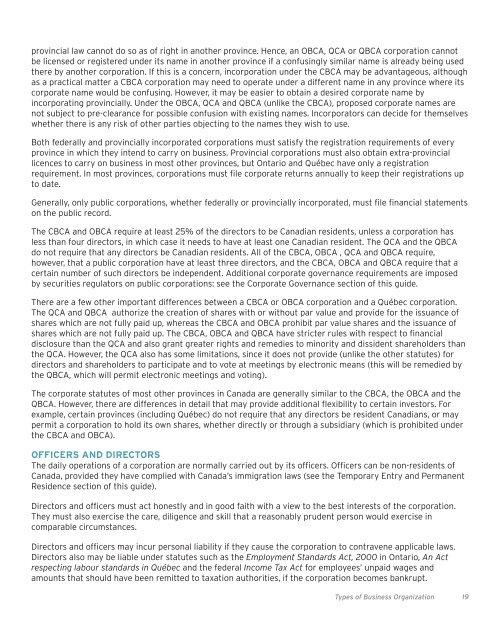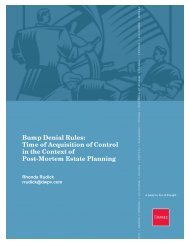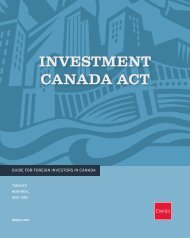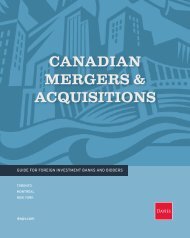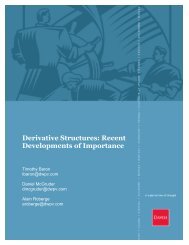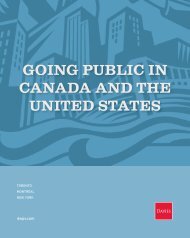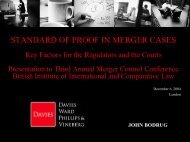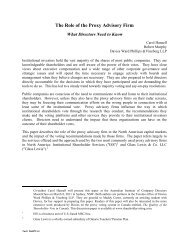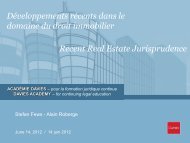TYPES OF BUSINESS ORGANIZATIONCORPORATIONSGENERALA corporation is the most frequently used form of <strong>bus<strong>in</strong>ess</strong> organization <strong>in</strong> Canada. A corporation has a legalpersonality dist<strong>in</strong>ct from its shareholders and management. A corporation’s existence is potentially perpetual,s<strong>in</strong>ce it is not affected by the departure or death of any or all of its shareholders or managers.As a separate legal entity, a corporation has rights, powers, privileges and obligations similar to those of<strong>in</strong>dividuals. It can hold property and carry on a <strong>bus<strong>in</strong>ess</strong> and can <strong>in</strong>cur legal and contractual obligations.Shareholders are the owners of a corporation, but they usually do not manage its <strong>bus<strong>in</strong>ess</strong> or enter <strong>in</strong>totransactions on its behalf. By statute, they are protected from liability for obligations or liabilities of thecorporation. In Canada (except <strong>in</strong> Québec), shareholders do not have to be disclosed on the public record.Generally, the authority to manage the corporation rests with the directors, who are elected by the shareholders(and whose names, as well as those of the corporation’s officers, are disclosed on the public record). However, ifthe shareholders prefer to reta<strong>in</strong> direct control of the corporation, they can enter <strong>in</strong>to a unanimous shareholderagreement. Such an agreement can effectively transfer responsibility (and liability) for the management of thecorporation from the directors to the shareholders. It does not have to be filed on the public record (although afederal corporation must <strong>in</strong>dicate on its annual return if its shareholders have entered <strong>in</strong>to a unanimousshareholder agreement).A corporation may be either public or private. In a public corporation, shares may be bought and sold bymembers of the general public. By contrast, the sale or transfer of shares <strong>in</strong> a private corporation is restrictedand usually requires the consent of a majority of the directors or shareholders.The ma<strong>in</strong> advantages of the corporation as a <strong>bus<strong>in</strong>ess</strong> entity are the limited liability of the shareholders, thepossibility of perpetual existence and the flexibility of the corporate form for f<strong>in</strong>anc<strong>in</strong>g and estate plann<strong>in</strong>gpurposes. The disadvantages <strong>in</strong>clude the costs associated with the <strong>in</strong>corporation, operation and dissolution ofthe corporation. S<strong>in</strong>ce a corporation is a separate taxpayer, shareholders cannot access directly any tax losses itmay generate, and it may be more difficult to use as a tax-efficient vehicle than an un<strong>in</strong>corporated entity like apartnership.FEDERAL OR PROVINCIAL INCORPORATIONA <strong>bus<strong>in</strong>ess</strong> corporation can be <strong>in</strong>corporated either federally, under the Canada Bus<strong>in</strong>ess Corporations Act (the“CBCA”), or <strong>in</strong> any of the prov<strong>in</strong>ces. In Ontario, <strong>bus<strong>in</strong>ess</strong> corporations are governed by the Bus<strong>in</strong>ess CorporationsAct (the “OBCA”). In Québec, the Companies Act (the “QCA”) will soon be replaced by the Bus<strong>in</strong>ess CorporationsAct (“QBCA”). It is expected that the QBCA will come <strong>in</strong>to force <strong>in</strong> late 2010 or early 2011. Throughout thissection we will refer to both the present QCA provisions and the future QBCA ones. QCA companies will beautomatically cont<strong>in</strong>ued under the QBCA without any formality, except for older companies <strong>in</strong>corporated underPart I of the QCA, for which articles of cont<strong>in</strong>uance will need to be filed.The CBCA, OBCA, QCA and QBCA prescribe essentially the same requirements, with some exceptions, the mostsignificant of which are discussed below. Under all of these statutes, <strong>in</strong>corporations can be effected quickly andat reasonable cost.A federal corporation has the right to carry on <strong>bus<strong>in</strong>ess</strong> under its corporate name <strong>in</strong> any prov<strong>in</strong>ce of Canada(although it must use a French form of its name <strong>in</strong> Québec). In contrast, a corporation <strong>in</strong>corporated under18 Types of Bus<strong>in</strong>ess Organization
prov<strong>in</strong>cial law cannot do so as of right <strong>in</strong> another prov<strong>in</strong>ce. Hence, an OBCA, QCA or QBCA corporation cannotbe licensed or registered under its name <strong>in</strong> another prov<strong>in</strong>ce if a confus<strong>in</strong>gly similar name is already be<strong>in</strong>g usedthere by another corporation. If this is a concern, <strong>in</strong>corporation under the CBCA may be advantageous, althoughas a practical matter a CBCA corporation may need to operate under a different name <strong>in</strong> any prov<strong>in</strong>ce where itscorporate name would be confus<strong>in</strong>g. However, it may be easier to obta<strong>in</strong> a desired corporate name by<strong>in</strong>corporat<strong>in</strong>g prov<strong>in</strong>cially. Under the OBCA, QCA and QBCA (unlike the CBCA), proposed corporate names arenot subject to pre-clearance for possible confusion with exist<strong>in</strong>g names. Incorporators can decide for themselveswhether there is any risk of other parties object<strong>in</strong>g to the names they wish to use.Both federally and prov<strong>in</strong>cially <strong>in</strong>corporated corporations must satisfy the registration requirements of everyprov<strong>in</strong>ce <strong>in</strong> which they <strong>in</strong>tend to carry on <strong>bus<strong>in</strong>ess</strong>. Prov<strong>in</strong>cial corporations must also obta<strong>in</strong> extra-prov<strong>in</strong>ciallicences to carry on <strong>bus<strong>in</strong>ess</strong> <strong>in</strong> most other prov<strong>in</strong>ces, but Ontario and Québec have only a registrationrequirement. In most prov<strong>in</strong>ces, corporations must file corporate returns annually to keep their registrations upto date.Generally, only public corporations, whether federally or prov<strong>in</strong>cially <strong>in</strong>corporated, must file f<strong>in</strong>ancial statementson the public record.The CBCA and OBCA require at least 25% of the directors to be Canadian residents, unless a corporation hasless than four directors, <strong>in</strong> which case it needs to have at least one Canadian resident. The QCA and the QBCAdo not require that any directors be Canadian residents. All of the CBCA, OBCA , QCA and QBCA require,however, that a public corporation have at least three directors, and the CBCA, OBCA and QBCA require that acerta<strong>in</strong> number of such directors be <strong>in</strong>dependent. Additional corporate governance requirements are imposedby securities regulators on public corporations: see the Corporate Governance section of this guide.There are a few other important differences between a CBCA or OBCA corporation and a Québec corporation.The QCA and QBCA authorize the creation of shares with or without par value and provide for the issuance ofshares which are not fully paid up, whereas the CBCA and OBCA prohibit par value shares and the issuance ofshares which are not fully paid up. The CBCA, OBCA and QBCA have stricter rules with respect to f<strong>in</strong>ancialdisclosure than the QCA and also grant greater rights and remedies to m<strong>in</strong>ority and dissident shareholders thanthe QCA. However, the QCA also has some limitations, s<strong>in</strong>ce it does not provide (unlike the other statutes) fordirectors and shareholders to participate and to vote at meet<strong>in</strong>gs by electronic means (this will be remedied bythe QBCA, which will permit electronic meet<strong>in</strong>gs and vot<strong>in</strong>g).The corporate statutes of most other prov<strong>in</strong>ces <strong>in</strong> Canada are generally similar to the CBCA, the OBCA and theQBCA. However, there are differences <strong>in</strong> detail that may provide additional flexibility to certa<strong>in</strong> <strong>in</strong>vestors. Forexample, certa<strong>in</strong> prov<strong>in</strong>ces (<strong>in</strong>clud<strong>in</strong>g Québec) do not require that any directors be resident Canadians, or maypermit a corporation to hold its own shares, whether directly or through a subsidiary (which is prohibited underthe CBCA and OBCA).OFFICERS AND DIRECTORSThe daily operations of a corporation are normally carried out by its officers. Officers can be non-residents ofCanada, provided they have complied with Canada’s immigration laws (see the Temporary Entry and PermanentResidence section of this guide).Directors and officers must act honestly and <strong>in</strong> good faith with a view to the best <strong>in</strong>terests of the corporation.They must also exercise the care, diligence and skill that a reasonably prudent person would exercise <strong>in</strong>comparable circumstances.Directors and officers may <strong>in</strong>cur personal liability if they cause the corporation to contravene applicable laws.Directors also may be liable under statutes such as the Employment Standards Act, 2000 <strong>in</strong> Ontario, An Actrespect<strong>in</strong>g labour standards <strong>in</strong> Québec and the federal Income Tax Act for employees’ unpaid wages andamounts that should have been remitted to taxation authorities, if the corporation becomes bankrupt.Types of Bus<strong>in</strong>ess Organization 19
- Page 1 and 2: DOING BUSINESSIN CANADAYOUR COMPLET
- Page 3 and 4: ONTENTSTABLE OF CONTENTSINTRODUCTIO
- Page 5 and 6: IntroductionPOLITICAL AND CONSTITUT
- Page 7 and 8: 5RealEstateIndustrial and Intellect
- Page 9 and 10: accordance with directions from the
- Page 11 and 12: TITLE INSURANCE, TITLE OPINIONS AND
- Page 13 and 14: 11EnvironmentalLawIndustrial and In
- Page 15 and 16: commercial activities, or carrying
- Page 17 and 18: The federal government currently re
- Page 19: 17Types ofBusiness OrganizationIndu
- Page 23 and 24: partnership, limited partners’ li
- Page 25 and 26: parties. In Québec, joint venturer
- Page 27 and 28: 25Financing aBusiness OperationIndu
- Page 29 and 30: The Civil Code of Québec provides
- Page 31 and 32: 29CorporateGovernanceIndustrial and
- Page 33 and 34: Instrument 58-101. The practices re
- Page 35 and 36: 33CompetitionLawIndustrial and Inte
- Page 37 and 38: BID-RIGGINGBid rigging is any agree
- Page 39 and 40: anticompetitive agreements among co
- Page 41 and 42: 39ForeignInvestmentIndustrial and I
- Page 43 and 44: apply for Canadian citizenship. (Pe
- Page 45 and 46: (D)GENERAL REVIEW THRESHOLDSThe fol
- Page 47 and 48: there be an "acquisition of control
- Page 49 and 50: Industrial and Intellectual Propert
- Page 51 and 52: to perform or cause them to be perf
- Page 53 and 54: Registration grants an exclusive ri
- Page 55 and 56: PIPEDA applies in all provinces of
- Page 57 and 58: Employment LawCanadian employment l
- Page 59 and 60: displacement, laying-off, suspensio
- Page 61 and 62: easonable cause to believe that the
- Page 63 and 64: 63Retirement Plans, EmployeeBenefit
- Page 65 and 66: • funding;• eligibility;• pen
- Page 67 and 68: 67Temporary Entry andPermanent Resi
- Page 69 and 70: INTERNATIONAL AGREEMENTSIn recent y
- Page 71 and 72:
immigrant in another class, he or s
- Page 73 and 74:
73Bankruptcy andInsolvency Proceedi
- Page 75 and 76:
BANKRUPTCYBankruptcy results in the
- Page 77 and 78:
INTERNATIONAL BANKRUPTCYASSETS LOCA
- Page 79 and 80:
Tax ConsiderationsThis chapter prov
- Page 81 and 82:
TAX REPORTINGAnnual Tax ReturnsCana
- Page 83 and 84:
Québec has legislation that limits
- Page 85 and 86:
Amendments, SIFTs and their unithol
- Page 87 and 88:
Conversely, where a Canadian reside
- Page 89 and 90:
A person, whether resident in Canad
- Page 91 and 92:
APPENDIX I: CANADA’S IN FORCE TAX
- Page 93:
TORONTODAVIES WARD PHILLIPS & VINEB


